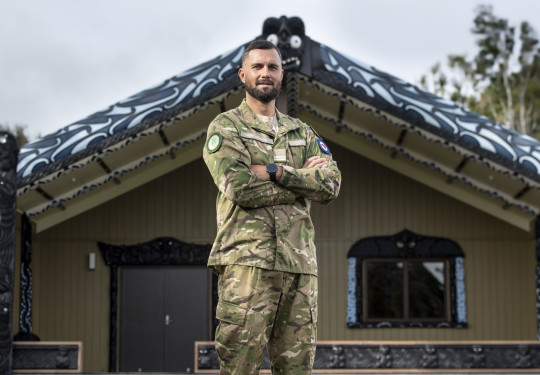Attesting in te reo Māori
Recruits arriving at Base Woodbourne at the beginning of their Air Force career now have a choice on whether they take their oath and affirmation in English or te reo Māori.
01 June, 2023
“There had been discussions for quite some time around the Air Force progressing in its journey as a bicultural organisation,” Māori Cultural Advisor (Air) Flight Lieutenant (FLTLT) Brad Anderson said.
“This means recognising te reo Māori as an official language of New Zealand and have that recognised in all of the formalities and the official documents that we have in the organisation.”
When the suggestion was made to offer a te reo Māori version of the oath and affirmation, FLTLT Anderson realised the notion aligned with government organisations and agencies who were already providing legal documentation in both English and Māori.
“We picked this in particular because of what it represented, because it was the official act of someone joining our organisation. We thought, man, what an awesome place to start.”
Te Taura Whiri (the Māori Language Commission) was brought in to take on the translation, which was then checked by Air Force Māori Advisory Group as the subject matter experts.
“We wanted it to withstand scrutiny and when you translate between English and Māori some of the intent can get lost if you don’t understand the context or meaning of what was trying to be said.
“So when we asked Te Taura Whiri to do it, I also met with their translators and talked them through the English version so they understood what the English references meant – what the context was behind some of the military jargon,” FLTLT Anderson said.
“After some discussions with NZDF Legal to ensure the legality of the te reo Māori versions were satisfied, the Chief of Air Force approved the Māori versions for use and directed it be implemented at the next intake.”
As the next intake of recruits arrived at Woodbourne to begin their careers, two of the new aviators chose to attest in te reo Māori.
“I spoke with them both afterwards and asked if they realised they had made history by being the first two to ever attest in te reo in the Air Force.
“I asked why they chose to attest in te reo. One answered that although they do not whakapapa to Māori they were raised to be culturally open-minded and knew the importance of the culture to our country – and as a representative of our country in the Air Force, wanted to support this,” FLTLT Anderson said.
“I thanked them both and told them how awesome it was that they had stepped up to the occasion.”
All the service was trying to do was to provide the equal opportunity for people to attest in either language, he said.
The move is in line with Kia Eke, the Māori Strategic Framework for Te Ope Katua o Aotearoa New Zealand Defence Force, which was introduced earlier this year.
There is wide recognition that a specific strategy is needed, with clear outcomes and goals, in order to improve partnership with Māori and make progress towards being a bicultural Defence Force.
Kia Eke involves identifying new opportunities while progressing many initiatives that are already happening across the Defence Force, which fall within the programme of change outlined by the framework.
At a service level the Air Force was focussing on education this year. This will aim to have te reo Māori classes delivered at all bases and increase specialist cultural resources through regular development wānanga. These will give focus to kaikōrero (orators) and kaikaranga (those who deliver karanga).
FLTLT Anderson said while everything that was happening with te ao Māori was a great start, there was still a way to go.
“In terms of becoming that authentic bicultural organisation, it will take more than what we have been able to achieve right now. But as we increase our cultural resources, recruit and retain more Māori and continue to provide and promote cultural education everyone within our organisation, we’ll get there.
“We are seeing a lot of support for the culture and it seems like somewhat of a revival within our society. The Māori language and culture is now being taught widely throughout all schools in New Zealand and as we do the same in the Air Force, we will get to where we want to be culturally. It’s a long term thing, but when I look at where we’ve come from – even 10 years ago and 10 years before that – I’m very optimistic about where we’ll be in 10 years’ time.”
